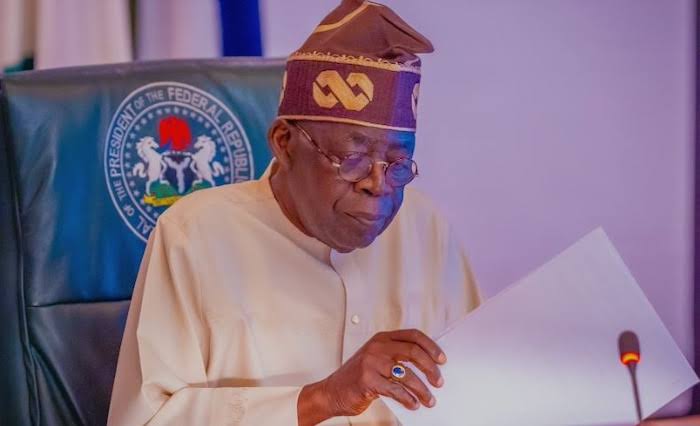Africa cannot depend on foreign dev blueprint –Tinubu
President Bola Ahmed Tinubu has charged African leaders to stop clinging to their old habit of depending on foreign plans and blueprints, saying the continent is in dire need of leaders who wield policy as a surgical blade. The president also lamented what he described as “the tragedy of our time” whereby African leaders do […]

tinubu
President Bola Ahmed Tinubu has charged African leaders to stop clinging to their old habit of depending on foreign plans and blueprints, saying the continent is in dire need of leaders who wield policy as a surgical blade.
The president also lamented what he described as “the tragedy of our time” whereby African leaders do not only confine themselves to foreign blueprints but have also refused to emancipate themselves from client-state mentalities and governance through hashtag activism.
President Tinubu spoke on Thursday in Abuja during the Dr Kayode Fayemi commemorative symposium and launch of the Amandla Institute for Policy and Leadership Advancement, with the theme “Renewing the Pan-African Ideal for the Changing Times: The Policy and Leadership Challenges and Opportunities.”
The event also marked Fayemi’s 60th birthday and a public presentation of the book, “If This Giant Must Rise: Interventions on Leadership and Governance in Africa.”
- Fayemi: Tinubu means well but intention is not enough
- Zulum commends Tinubu for approving Alau Dam reconstruction
Represented by Vice President Kashim Shettima, the president said, “Whatever our differences across the continent, one fact that can’t be eroded by our infighting is that we are in the age of machines, and we can’t fight our development dilemma with spears and arrows while the rest of the world is fighting the same battle with missiles and tanks.
“While we parse political rivalries, others parse datasets. While we litigate history, others engineer futures. The train of progress accelerates, yet too many of our leaders cling to old carriages. These are our client-state mentalities, our dependency on foreign blueprints, and our governance by hashtag activism. This is the tragedy of our time.
“The founding of Amandla Institute emerges as an antidote to this paralysis. We are here not only to generate more ideas but to create executors. We need leaders who wield policy as a scalpel, not a slogan. We need visionaries who see AI as a collaborator, not a competitor. We need a generation of Africans who recognise that Pan-Africanism, renewed for this age, must be rooted in actionable sovereignty.”
President Tinubu pointed out that it would be wishful thinking to hope that the renaissance of Africa will happen as a gift, maintaining that it must be built.
He regretted that for too long, leaders in Africa have outsourced their thinking, relying on institutions and ideologies that treat countries on the continent “as consumers, not creators, just as he insisted that the youth must be empowered to innovate in tech hubs across the continent.
“But the post-idea world dissolves excuses. With the democratisation of knowledge, we must empower our youth to innovate in tech hubs across the continent, from Cairo, down through Nairobi, to Lagos, building unicorns without the permission of any gatekeepers. What they lack is not ideas but ecosystems—systems where policy, funding, and political will converge to scale their genius,” he noted.
The Nigerian leader further urged African leaders to “evolve from custodians of power to architects of platforms,” adding that their “imagination of Africa must be one where every government ministry houses AI strategists, where continental trade policies are drafted by homegrown think tanks like Amandla Institute, not foreign consultants, and where “Made in Africa” signifies not raw materials but algorithms, green tech, and cultural capital.”
President Tinubu urged Amandla to sell Africa to the world as a continent that seeks collaboration, and not patronage, stating that, “The institute must become a command centre for the continent, turning thinkers into doers, policies into progress, and Pan-African ideals into lived realities.”
Also in his address, former Head of State Yakubu Gowon stated that for pan-Africanism to move forward, there was the need for a grounded, locally relevant solution that directly addressed the unique challenges within African nations.
Speaking earlier, in his keynote address, former South African president, Thabo Mbeki, said development aspirations and targets across Africa have largely not been met due to a multiplicity of factors, including inadequate resource mobilisation and poor leadership.
In his vote of thanks, Fayemi said though 60 is a retirement age in some countries, he had assured people around him that he was not going to rest on his oars until the situation of poverty and inequality in society improves.
